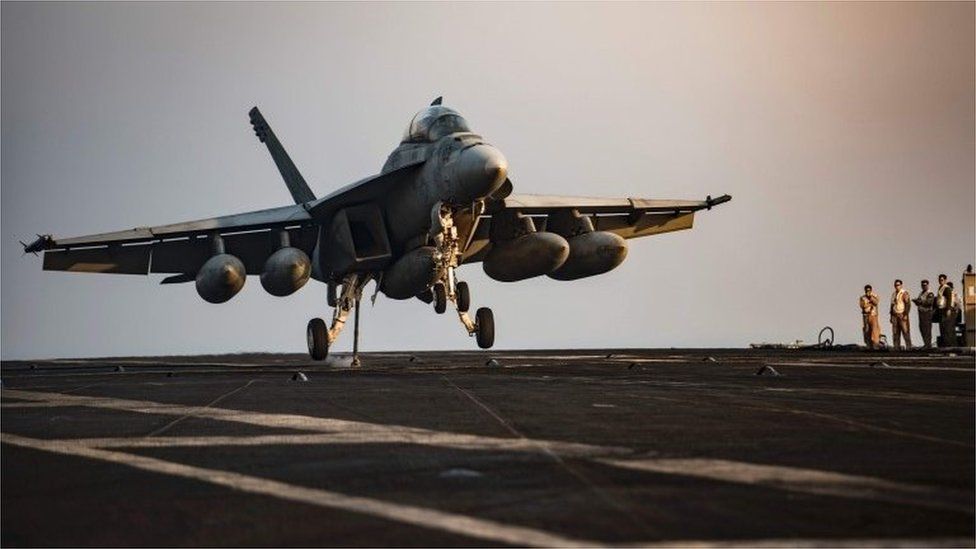Syrian war: US scrambles jets to Hassakeh
- Published

American fighter planes have been scrambled to the Syrian city of Hassakeh to protect US special forces on the ground from Syrian government aerial attacks, the US military says.
The Pentagon said the Syrian planes were leaving as its jets arrived.
People in the north-eastern Syrian city say government warplanes have hit Kurdish districts there for the past two days.
Thousands are reported to have fled their homes.
Hassakeh is mainly under the control of a Kurdish militia, the YPG.
What exactly happened?
Syrian government's warplanes bombed Kurdish areas of Hassakeh for the second day running on Friday. On Thursday, the US "scrambled" - quickly launched - fighter jets to defend some special forces soldiers that were in the area, but did not have to engage in combat because the Syrian planes turned and left as they arrived. Much of Hassakeh is controlled a Kurdish militia, the YPG.
What are US special forces and what are they doing in Syria?
Special forces are elite soldiers with specialist skills, who often work undercover. There are 300 US special forces troops in Syria. Most of them were sent there in the past few months. They support local militias, including the YPG, in the fight against so-called Islamic State (IS).
Why does this matter?
No weapons were fired between the US and Syria, but the incident was enough of a threat against US personnel on the ground for the coalition's military apparatus to swing into action. It is thought to be the first time this has happened.
Pentagon spokesman Capt Jeff Davis said that as far as he was aware, Thursday's mission was the first time that coalition aircraft had been scrambled to respond to an incident involving Syrian government aerial bombardment.
The US had no radio contact with the Syrian planes.
Capt Davis told journalists that the US had warned Syria via its communication channel with Russia that it would defend coalition troops.
He said the strikes "did not directly impact our forces" but they were "close enough that it gives us great pause".
US President Barack Obama has authorised the deployment of special forces troops in Syria to support local militias in the fight against IS, but he has repeatedly ruled out sending ground forces to the conflict.
In a statement on Syrian state TV on Friday evening, the general command of the Syrian army accused Kurdish forces of "attacking state institutions, stealing oil and cotton, obstructing exams, kidnapping unarmed civilians and spreading chaos and instability".
These actions required an appropriate response from the army, the statement said.
A Kurdish journalist who is in Hassakeh, Heybar Othman, told the BBC that it was the first time the Syrian government had used air power against the city.
"Right now in the city you don't have electricity, you don't have bread," he said.
"We don't have [a] specific number of casualties but approximately 12 civilian people [were] killed and more than 33 injured."
The YPG has emerged as a major fighting force in northern Syria in the past two years, becoming a key ally of the US-led coalition against IS.
Kurds made up between 7% and 10% of Syria's population of 24.5 million before the uprising against President Bashar al-Assad began five years ago.
Although they were denied basic rights and suffered decades of political suppression by the Arab-led state, most Kurds avoided taking sides when a wave of protests swept the country.
When government forces withdrew from Kurdish areas to concentrate on fighting rebels elsewhere in mid-2012, Kurdish militias led by the YPG swiftly took control.